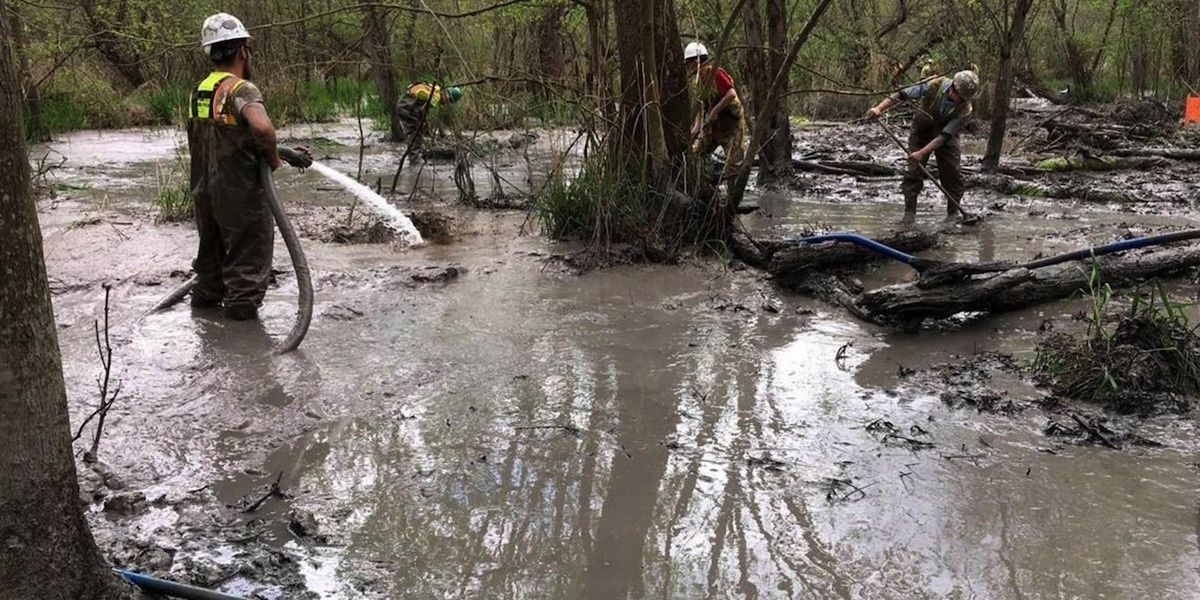

Workers clean up a spill by Rover Pipeline affecting wetlands in Stark County, Ohio. Ohio EPA
A damning new report has highlighted the spotty incident record of
Energy Transfer, which owns tens of thousands of miles of pipelines across America, including the controversial Dakota Access Pipeline.
The Texas-based energy company and its subsidiary
Sunoco have amassed more than 800 federal and state permit violations and millions of dollars in fines while building its two newest natural gas pipelines, the Rover and Mariner East 2, respectively, Reuters reporters Scott DiSavino and Stephanie Kelly revealed Wednesday.
To compare, Reuters analyzed four similar pipeline projects and found they averaged 19 violations each during construction.
For a breakdown of Energy Transfer Rover’s 681 federal violations, see: https://t.co/kVGDgUG0MI.
— Stephanie Kelly (@StephanieKellyM) November 28, 2018
Rover and Mariner violations include spills of drilling fluid; sinkholes in backyards; and improper disposal of hazardous waste and other trash, with fines topping at $15 million, according to Reuters.
Rover started construction in March 2017, while Mariner started in February 2017. The two troubled pipelines were slated for completion last year, but construction has slowed due to state and federal regulators halting the work after permit violations.
The $4.2 billion Rover pipeline is a 713-mile interstate project designed to transport up to 3.25 billion cubic feet per day of fracked gas. Its proposed route includes Pennsylvania, West Virginia, Ohio, Michigan and Canada. In one of its most high-profile spills, the pipeline project released 2 million gallons of drilling fluids into Ohio wetlands last April. It followed with another 150,000 gallons of drilling fluid at the same site in January.
“Ohio’s negative experience with Rover has fundamentally changed how we will permit pipeline projects,” James Lee, a spokesman for the Ohio Environmental Protection Agency, told Reuters.
The $2.5 billion Mariner East 2 is a 350-mile pipeline project designed to carry 275,000 barrels a day of butane, propane and other liquid fossil fuels from Ohio and West Virginia, across Pennsylvania to the Atlantic coast. Last year, horizontal directional drilling triggered
three releases of drilling fluid around the same site in East Goshen, Pennsylvania in the span of three days.
In September, a 24-inch natural gas line owned by Energy Transfer and Sunoco
exploded in Beaver County, Pennsylvania a week after it was activated. The explosion prompted calls from environmentalists and lawmakers to halt the Mariner pipeline, which is currently under construction in the state.
Energy Transfer Pipeline Explodes in Pennsylvania #WarOnOurFuture via @EcoWatch https://t.co/U2N0xnGuM1
— The YEARS Project (@YEARSofLIVING) September 11, 2018
After that blast,
Waterkeeper Alliance called out Energy Transfer’s (formerly known as Energy Transfer Partners) history of pipeline incidents.
“Waterkeeper Alliance and Greenpeace
meticulously documented more than 500 spills and millions of dollars in fines and property damage by Energy Transfer Partners in a report released earlier this year,” Waterkeeper Alliance staff attorney Larissa Liebmann said in a statement received by EcoWatch.
Their April report found that Energy Transfer, its subsidiaries including Sunoco, and joint ventures reported 527 hazardous liquids pipeline incidents to federal regulators from 2002 to 2017, or once every 11 days on average for 16 years.
In response to the Reuters report, Energy Transfer spokeswoman Alexis Daniel said the company is committed to safe construction and operation and at times went “above and beyond” regulations for the Rover and Mariner projects.

 233k
233k  41k
41k  Subscribe
Subscribe 